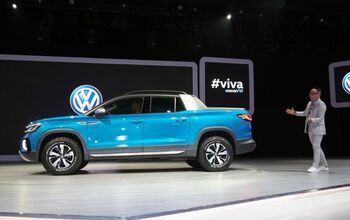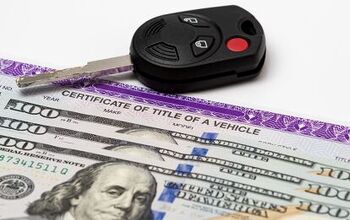Branded! How the Big Three Lost Pickup Truck Loyalty
Once upon a time, a "brand" was something you burned into the hide of your horse. The mark told everyone "this one's mine." It also served as a kind of frontier Lo-Jack against the varmits what done rustled your horses. In those days, brands were just about impossible to change. Now as then, "brand loyalty" was the breeder's best chance of staying in business. Only applied to modern pickup trucks, the concept is fast going the way of the Conestoga wagon.
As recently as a decade ago, America's flatbed fraternity fell into three camps: "I'm a Chevy truck man" or "I'm a Ford truck man" or "I'm a Dodge guy." If I had a nickel for every rear window vinyl graphic I've seen of Calvin peeing on a rival brand's logo, I could play the Atlantic City slots for the rest of my life.
When foreign trucks first hit our shores, truck guys dismissed them as "Tonka Toys." They were considered cute little rice burners for people who couldn't afford a "real truck." Just in case the base was tempted by the small is beautiful gestalt, Chevy and Ford fired back at their diminutive competition with the S-10 and Ranger, respectively. Initially, they weren't bad trucks t'all. Brand loyalty survived.
The Japanese automakers did what they do: adapt, survive, thrive. Each model year issued forth an evolution– and I don't mean the shape of the front grille. The Japanese rigorously applied the not-so-secret pickup truck formula: reliability, practicality, style. Engines got bigger. Payloads improved. Amenities became more amenable. In the process, they gradually removed most (if not all) of the reasons NOT to buy one of their pickups.
In Marketing-land, "influencers" and "alphas" are the people who determine how the wider populace perceives products and brands. A decade or so ago, a prospective pickup truck buyer turning to an automotive alpha for advice would get a lecture on why Ford, Chevy or Dodge made the best vee-hicle, bar none. Today even the most rabid pickup truck partisan understands that the flatbed buyer's choices are no longer so clear cut, or cut-and-dry.
Sure, you can still find pickup-driving guys hitting the honky tonks wearing tight jeans held up by Blue Oval belt buckles. But Japanese persistence has caused a decided and dramatic shift in the truck landscape; there's been a massive erosion in traditional brand loyalty.
These days, the difference between various brands' pickups is relatively minute. Whereas influencers used to sell their friends on a brand, they now talk about product. F-150, Silverado, Ram, Tundra, Titan, Ridgeline– which is the best pickup? Well, that depends…
Have a look at the streets of Amarillo, Laredo and Dallas. No question: them funny furriner pickups is showin' up in ever greater numbers. Where every red light once stopped a sea of Rams, F-150s and 1500s, you'll now find a decidedly international mix of Tundras, Titans, and yes, Ridgelines waiting their turn.
Don't get me wrong: The Big 2.8 still make mighty fine pickups. Japanese products haven't "blown them out of the water"– as Japanese cars did to America's compact and mid-size sedans. But Toyota and Nissan's single-mindedness and high profile in other parts of the American automotive landscape, has paid off in a more subtle way. They've turned "Hell no!" into "What's the best truck I can get?"
To entice open-minded buyers and suggestible alphas to look beyond traditional brand loyalty, the Japanese are currently playing the inscrutability and "dare to be different" marketing cards. The Nissan Titan is… the Titan of trucks. Honda dares buyers to "Break the Truck Mold." And Toyota is the "Truck that's changing it all."
In a very real sense, Toyota's right. In today's more malleable market, The Big 2.8 have to distinguish themselves from the competition. And that means examining their pickups' core competencies, choosing one, developing it and refining their marketing focus to suit.
At the moment, Ford claims its F-150 "Hauls more. Tows more. Built for more." Chevy touts the Silverado's Truck of the Year award and instructs the sheeple to "Follow the leader." Dodge proclaims the Ram the pickup buyer's longest-lasting option.
Although these tag lines suggest Detroit's drawing the battle lines, the domestics have a nasty habit of thinking short term. Their marketing departments tend to chase the trend of the moment, to react to fickle consumer fashions. This ADD limits the Big 2.8's ability to pick one unique selling point and stick with it.
Also, pickup trucks are like Swiss Army knives. Asking a domestic manufacturer to pick a blade and promote the Hell out of it is like asking a cowboy to ride a thoroughbred. Still, when you're in a race for your life, a workhorse isn't your best option– no matter how famous the brand it bears.
I'm a marketing guy, who loves cars - but hates most automobile advertising. I'm also a writer, graphic designer, animator, musician, and stand-up philosopher.
More by Brad Kozak
Latest Car Reviews
Read moreLatest Product Reviews
Read moreRecent Comments
- Kwik_Shift_Pro4X No thanks. You'll never convince me that anybody needs this.
- Kwik_Shift_Pro4X I'd rather do the driving.
- SCE to AUX EVs are a financial gamble for any mfr, but half-hearted commitment will guarantee losses.BTW, if there were actual, imminent government EV mandates, no mfr could make a statement about "listening to their customers".
- Zachary How much is the 1984 oldmobile (281)8613817
- Yuda Very dystopian. Not good.


































Comments
Join the conversation
Count me as one that likes small pick-ups. I had a Chevy S-10 with the 4 cylinder engine, manual transmission, and 2 wheel drive. I used it as a back up to my big work van. I’d use the pick-up to haul garbage, work tools, materials, etc., that I didn’t really need the van for. I wound up selling the pick-up for a car as I started using the van more and figured a car to be more fun driving. But a friend of mine has taken to using several 8 foot work trailers instead of a big work van, towed by a midsize SUV (Chevy TrailBlazer). He is able to customize each trailer for the job he is on and gets to drive a nicer tow vehicle. I could see myself doing the same thing as each trailer would weigh in at about 2500 LBS except that I would want a small pick-up instead with maybe a V6 option (a Diesel version would be nice).
I wonder whether captive imports had any impact on the erosion of brand loyalty. After all, if (forex) Chevrolet was impressed enough with the Suzuki Sidekick/Vitara to slap a bowtie on it and sell it as a Chevy Tracker, then why not just buy the one with the Suzuki S badge? Ditto for various Dodge products that were just rebadged Mitsubishis. (IIRC, Ford captive imports have tended to be vehicles built in Ford factories overseas [such as the 1978-1980 Ford Fiesta].) If my hypothesis is right, once the badge mystique was broken by captive imports, people saw less reason to remain loyal to a given company's vehicles. Why stay loyal to Chevrolet when Chevy isn't loyal to itself, putting its name on Suzukis, Isuzus and Daewoos?